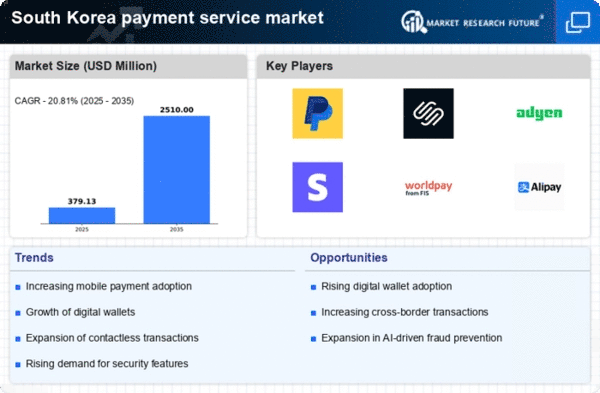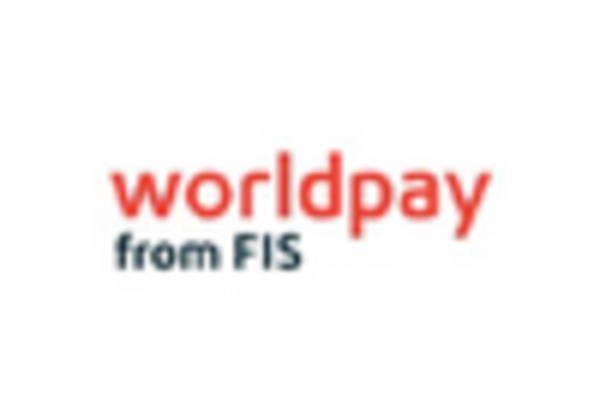Rising E-commerce Growth
The payment service market in South Korea is significantly influenced by the rapid growth of e-commerce, which has seen a remarkable increase in online shopping activities. As of 2025, e-commerce sales account for approximately 25% of total retail sales in the country, highlighting a shift in consumer purchasing behavior. This surge in online shopping necessitates efficient and secure payment solutions, prompting businesses to invest in advanced payment technologies. The integration of various payment methods, including credit cards, digital wallets, and bank transfers, is becoming essential for e-commerce platforms to cater to diverse consumer preferences. Consequently, the payment service market is evolving to accommodate these changes, with a focus on enhancing transaction security and user experience, thereby driving further growth in the sector.
Increasing Digital Wallet Adoption
The payment service market in South Korea is experiencing a notable shift towards digital wallets, driven by consumer preferences for convenience and security. As of 2025, approximately 70% of South Koreans utilize digital wallets for transactions, reflecting a significant increase from previous years. This trend is further supported by the proliferation of smartphones and the integration of advanced security features such as biometric authentication. The rise in digital wallet adoption is reshaping the payment service market, as businesses adapt to meet consumer demands for seamless payment experiences. Furthermore, the competitive landscape is intensifying, with numerous fintech companies entering the market, offering innovative solutions that enhance user experience. This dynamic environment suggests that the payment service market will continue to evolve, with digital wallets playing a central role in shaping future payment behaviors.
Consumer Demand for Enhanced Security Features
In the payment service market, consumer demand for enhanced security features is becoming increasingly prominent. As digital transactions rise, concerns regarding data breaches and fraud have escalated, prompting consumers to seek payment solutions that prioritize security. Surveys indicate that approximately 75% of South Koreans consider security a critical factor when choosing payment methods. This heightened awareness is driving payment service providers to invest in advanced security technologies, such as encryption and multi-factor authentication. Consequently, the market is witnessing a shift towards solutions that not only facilitate transactions but also ensure the protection of sensitive information. This focus on security is likely to shape the future landscape of the payment service market, as companies that prioritize consumer trust and safety may gain a competitive advantage.
Technological Advancements in Payment Solutions
Technological advancements are playing a crucial role in shaping the payment service market in South Korea. Innovations such as contactless payments, blockchain technology, and artificial intelligence are transforming how transactions are conducted. As of November 2025, the adoption of contactless payment methods has reached approximately 60% among consumers, indicating a strong preference for speed and convenience. Additionally, the integration of AI in fraud detection and customer service is enhancing the overall security and efficiency of payment systems. These technological developments are not only improving user experiences but also driving competition among payment service providers. As companies strive to differentiate themselves through innovative solutions, the payment service market is likely to witness continued growth and evolution in the coming years.
Government Initiatives for Cashless Transactions
The South Korean government is actively promoting cashless transactions, which significantly impacts the payment service market. Initiatives such as tax incentives for businesses that adopt digital payment systems and campaigns to encourage consumers to use electronic payments are gaining traction. As of November 2025, the government is aiming to increase the cashless transaction rate to 80% by 2027, indicating a strong commitment to transforming the payment landscape. This push towards a cashless society is likely to foster innovation within the payment service market, as companies develop new technologies to facilitate easier and faster transactions. Additionally, the government's support for fintech startups is expected to enhance competition and drive advancements in payment solutions, ultimately benefiting consumers and businesses alike.
















